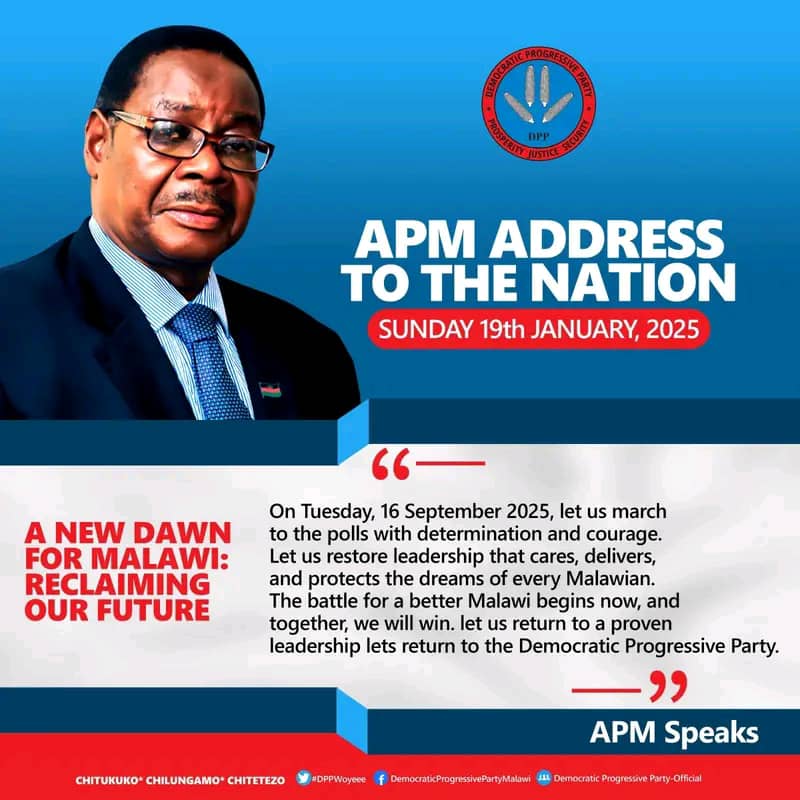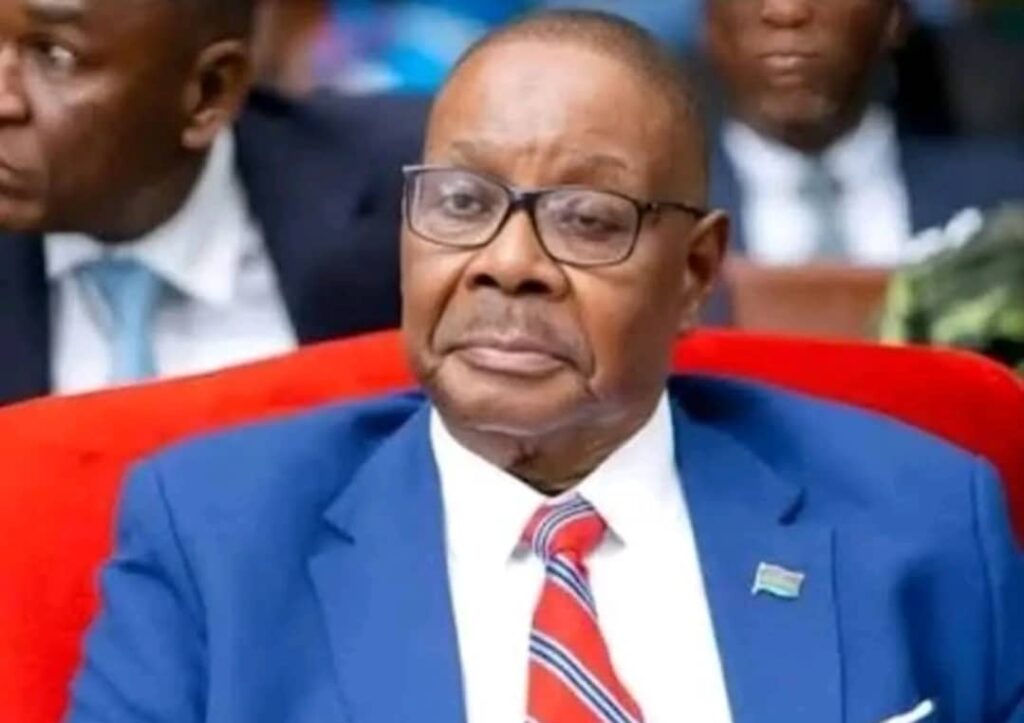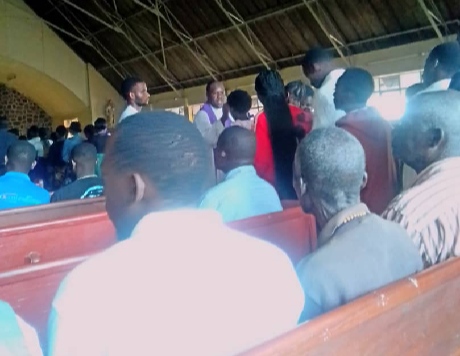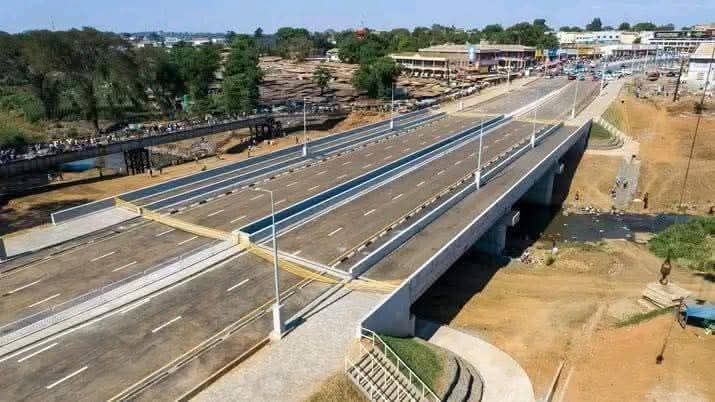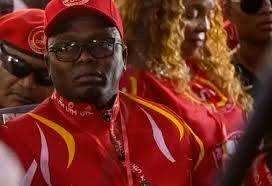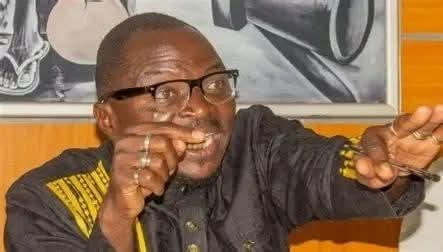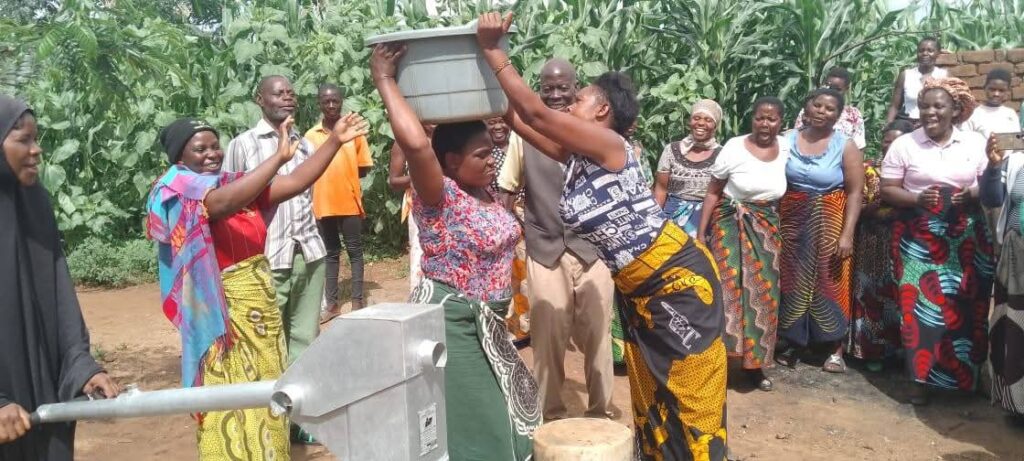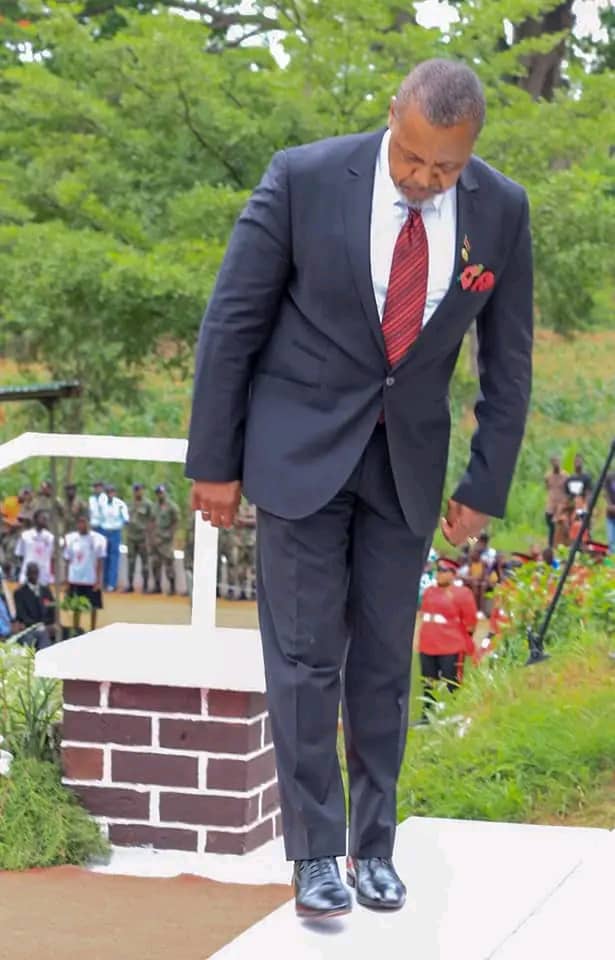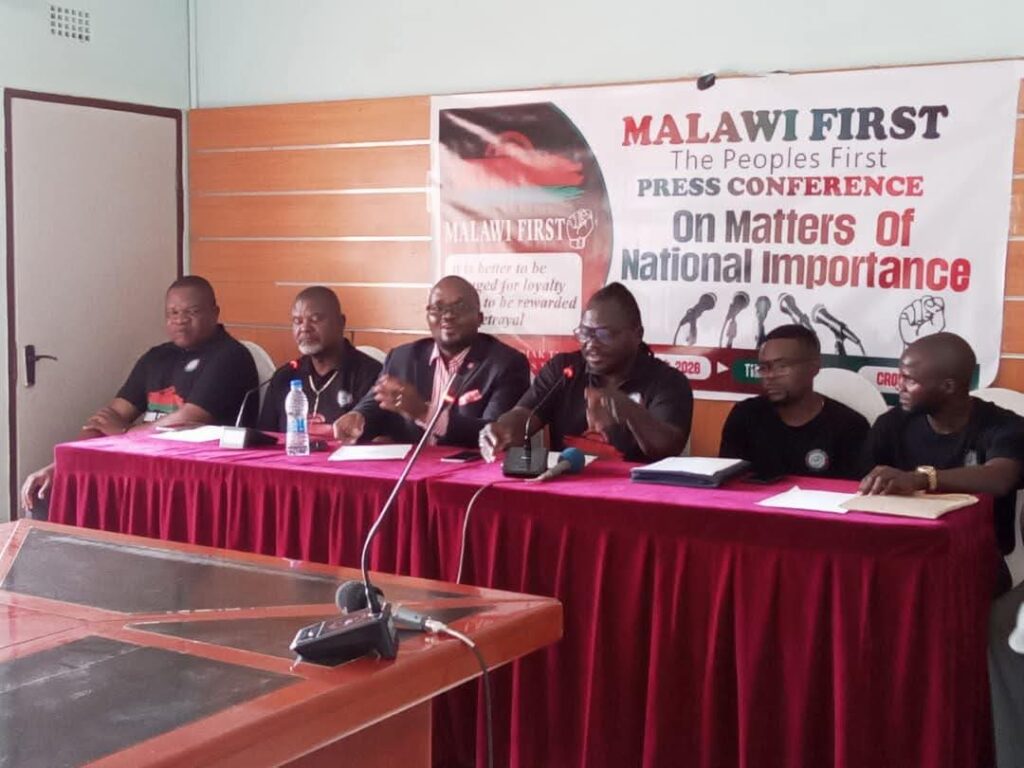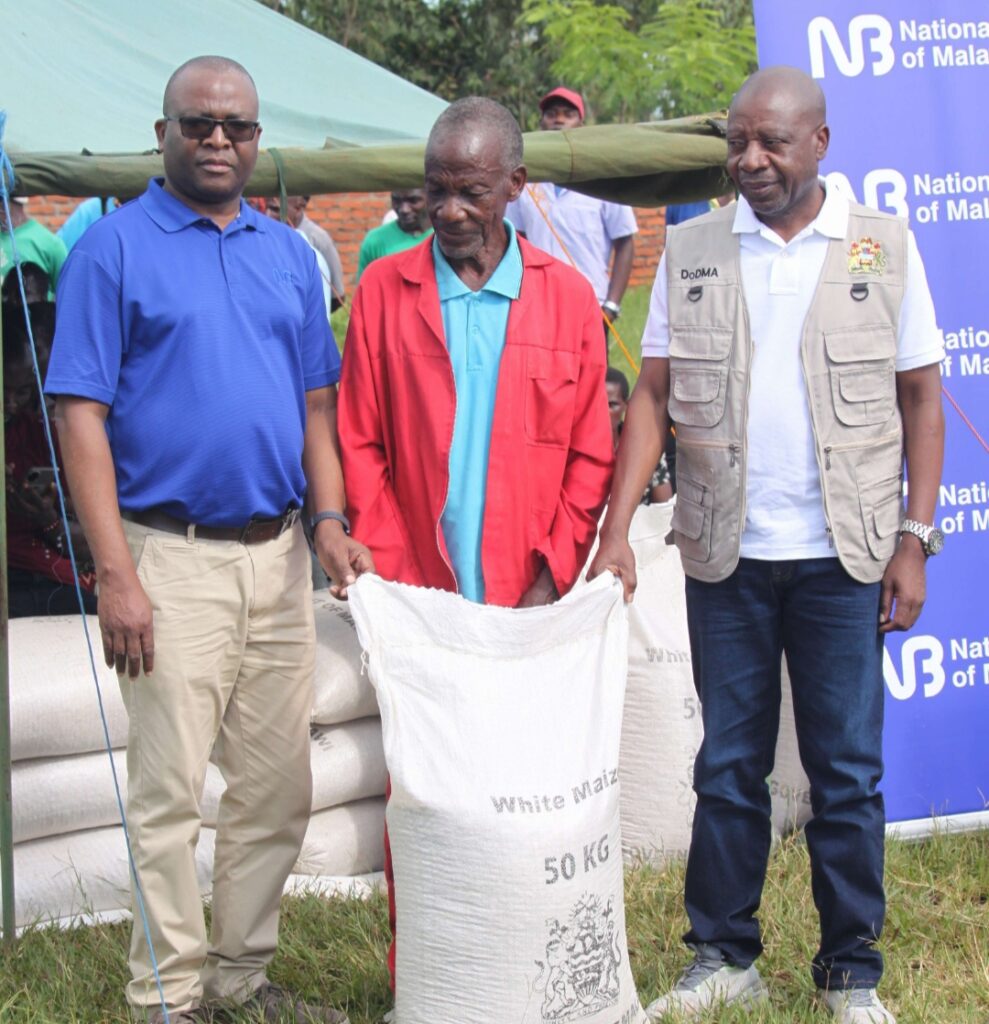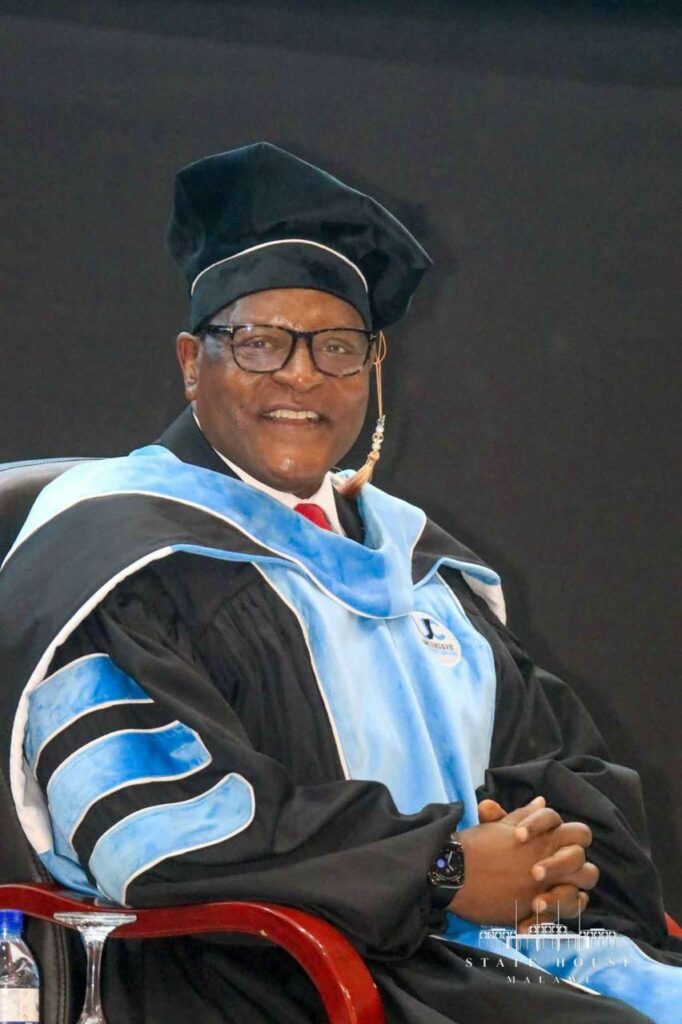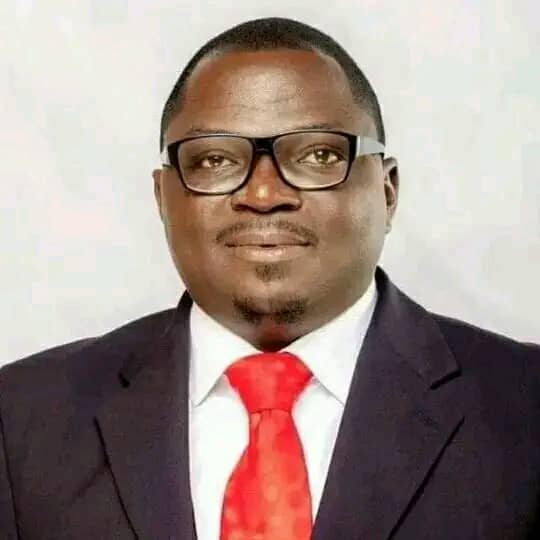By Burnett Munthali
On Tuesday, September 16, 2025, former President Peter Mutharika addressed the nation, urging Malawians to rally behind the Democratic Progressive Party (DPP) in the upcoming elections. His speech emphasized the need for a return to “proven leadership” — a leadership that “cares, delivers, and protects the dreams of every Malawian.” The tone of the address was one of determination and unity, as Mutharika painted the upcoming election as a “battle for a better Malawi.” With the political climate in Malawi fraught with socio-economic challenges, his words resonated deeply with voters yearning for change.
To gain further insights into the implications of Mutharika’s address, I reached out to social commentator Twink Jones Gadama, who has been closely monitoring the political dynamics in Malawi. Below, we delve into his analysis of the speech and its potential impact on the DPP’s electoral prospects.
1) Analysis of leadership appeal
Mutharika’s call to return to “proven leadership” comes at a time when Malawi is grappling with severe economic and social challenges, such as rising unemployment, food insecurity, and economic instability. In his address, he highlighted the qualities of care, delivery, and protection of dreams, positioning himself as the leader who can bring tangible results. According to Gadama, this appeal is likely to resonate with many voters who are dissatisfied with the current administration’s handling of the country’s affairs. “In times of economic hardship, voters are naturally drawn to leadership that promises stability and improvement,” Gadama noted. Mutharika’s invocation of “proven leadership” serves as a reassuring message, offering a sense of security and the hope of better governance in uncertain times.
2) Rhetoric of unity and courage
Mutharika’s speech was charged with strong language, urging the nation to “March to the polls with determination and courage.” He framed the election as a critical juncture, a “battle for a better Malawi.” Gadama interprets this rhetoric as a strategic move to galvanize the electorate. “It is a rallying cry that will energize voters, particularly those who feel alienated or disillusioned with the current leadership,” he said. However, he also cautions that the intensity of this language could potentially heighten political tensions. “While it may inspire some, it might also intensify divisions among the electorate, especially if the rhetoric is perceived as too combative.”
3) Nostalgia and party politics
A significant element of Mutharika’s speech was his call to return to the DPP, invoking nostalgia for his time in office. Nostalgia plays a powerful role in Malawi’s political environment, where past leaders are often remembered for both their achievements and shortcomings. Gadama suggests that this emotional appeal is likely to resonate with voters who feel nostalgic for a time they perceived as more stable or prosperous under Mutharika’s rule. “For many, the DPP under Mutharika represents a time when the country had a clearer direction, even if it was marked by its own set of challenges,” Gadama explained. While acknowledging that the DPP’s reputation has been tarnished over the years due to corruption scandals, he believes that Mutharika’s leadership is still favorably viewed by many. “His policies, particularly in infrastructure and foreign relations, are still regarded positively by some voters,” he added.
4) Economic and social context
In a nation grappling with widespread poverty, food insecurity, and unemployment, Mutharika’s speech highlighted the contrast between his vision of leadership and that of the current administration. “The electorate will likely respond positively to Mutharika’s critique of the current government’s economic record,” Gadama stated. He believes that Mutharika’s emphasis on delivering results could strike a chord with voters who feel that their socio-economic conditions have worsened under the current government. Mutharika’s past experience in governance may be seen as an asset in navigating the country’s economic challenges, which many Malawians are struggling to cope with.
5) Political strategy and campaign messaging
Mutharika’s campaign message, centered around care, delivery, and the protection of dreams, is a deliberate attempt to create a narrative of stability and hope. Gadama views this approach as effective in a time of political and economic uncertainty. “Voters are not just looking for rhetoric; they are looking for a leader who can provide practical solutions,” he explained. By emphasizing these qualities, Mutharika positions himself as a leader who understands the challenges of ordinary Malawians and is committed to addressing them. However, Gadama also notes that Mutharika’s message must be backed by concrete policies and plans to resonate with voters in the long term.
6) Electoral implications for the DPP
Mutharika’s call for a return to the DPP presents an opportunity for the party to reclaim power, but it is not without risks. While tapping into nostalgia can be a powerful tool, relying solely on past leadership may alienate younger voters or those who feel the DPP’s past governance was marred by corruption and mismanagement. Gadama believes that the DPP’s future success will hinge on balancing the appeal of Mutharika’s leadership with a forward-looking agenda that addresses the pressing issues of the day. “The DPP must find a way to address both the nostalgia for Mutharika’s era and the need for new ideas,” he suggested.
7) Overall assessment of Mutharika’s Speech
Gadama sees Mutharika’s speech as strategically significant for the DPP. “It was a masterstroke in positioning Mutharika as the leader who can offer solutions to Malawi’s problems,” he said. The speech not only emphasized Mutharika’s commitment to improving the country’s socio-economic situation but also reinforced his leadership credentials. However, as the election campaign progresses, Mutharika will face challenges in ensuring that his message resonates with a broad cross-section of voters, particularly those who feel that the DPP failed to deliver on key promises during its previous tenure.
8) Public sentiment and voter mobilization
Gadama believes that Mutharika’s speech has the potential to mobilize voters, particularly those who are disillusioned or dissatisfied with the current government. The call for unity and courage could inspire a more engaged electorate, as Malawians may see this as their chance to reclaim the country’s future. “Such speeches play a crucial role in motivating voters, especially those who feel disconnected from the political process,” he explained. However, he also warns that voter apathy could still pose a risk, as some may feel that political rhetoric does not translate into tangible change.
9) Final thoughts
Gadama concludes by affirming that Mutharika’s message has the potential to shift the political tide in favor of the DPP, but the party must do more than rely on past successes. “While nostalgia is powerful, it will not be enough to win the election. The DPP needs to present a clear, actionable plan for the future,” he said. Ultimately, Mutharika’s speech serves as a pivotal moment in Malawi’s electoral history, but its success will depend on how effectively the DPP can translate rhetoric into real political change.
In conclusion, the 2025 elections approach, former President Peter Mutharika’s address serves as a reminder of the enduring power of leadership narratives in Malawi’s political landscape. While his call for a return to “proven leadership” and his rhetoric of unity and courage may energize certain sections of the electorate, the true test will lie in the DPP’s ability to offer concrete solutions to the pressing issues facing Malawians. The road to the polls is likely to be a battleground not just for political control, but for the future direction of the country itself.
- FGRF Reaches 100,000 Families with Ramadan Food Relief Across Malawi
- Mutharika storms back: Economy rebounds as Maize prices fall and fuel returns to pumps
- Priest Urges Christians to Pray During Lent
- HAPPY BIRTHDAY to Shepherd Bushiri – A life of impact, faith and generosity
- New Lilongwe Bridge: A Symbol of Partnership Beyond Party Lines
- RUMPHI DESERVES BETTER: Ntumbuka Blasts VP Chihana Over ‘Neglected’ Access Road
- Bon Kalindo: Anti-Corruption Efforts Must Be Evidence-Based
- Frank Mbeta Sakupita Kulikonse: Kukhazikika kwa Dziko Kuposa Ndale Zoipitsa
- Malawi Relief Funds UK Drills 12 Boreholes in Dowa, Bringing Safe Water to Over 300 Households
- Namalomba says Mutharika’s government wants closure of Chilima’s death
- Onjezani Kenani expresses concern over Amaryllis Hotel overpriced sale
- Florence Mwangi to Speak at Global Protocol & Diplomatic Network Summit 2026
- Malawi First, People Power Movement Dismiss Corruption Claims Against Frank Mbeta
- NBM plc gives 1,000 bags of maize relief in Zomba
- Limpopo FM calls DPP to speed up all corruption cases in court

